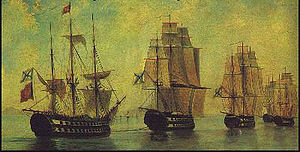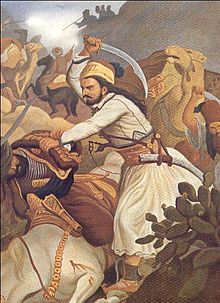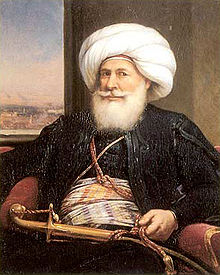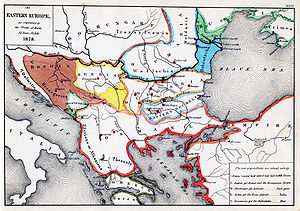- Eastern Question
-
The "Eastern Question", in European history, encompasses the diplomatic and political problems posed by the decay of the Ottoman Empire. The expression does not apply to any one particular problem, but instead includes a variety of issues raised during the 18th, 19th, and 20th centuries, including instability in the European territories ruled by the Ottoman Empire.
The Eastern Question is normally dated to 1774, when the Russo-Turkish War (1768–1774) ended in defeat for the Ottomans. As the dissolution of the Ottoman Empire was believed to be imminent, the European powers engaged in a power struggle to safeguard their military, strategic and commercial interests in the Ottoman domains. Imperial Russia stood to benefit from the decline of the Ottoman Empire; on the other hand, Austria-Hungary and the United Kingdom deemed the preservation of the Empire to be in their best interests. The Eastern Question was put to rest after World War I, one of whose outcomes was the collapse of the Ottoman Empire.
Contents
Background
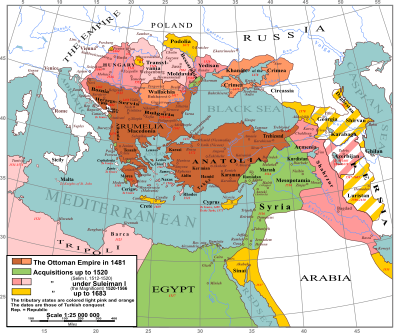 At the height of its power (1683), the Ottoman Empire controlled territory in the Near East and North Africa, as well as Central and Southeastern Europe.
At the height of its power (1683), the Ottoman Empire controlled territory in the Near East and North Africa, as well as Central and Southeastern Europe.
The Eastern Question emerged as the power of the Ottoman Empire began to decline during the 17th century. The Ottomans were at the height of their power in 1683, when they lost the Battle of Vienna to the combined forces of the Polish-Lithuanian Commonwealth and Austria, under the command of John III Sobieski. Peace was made much later, in 1699, with the Treaty of Karlowitz, which forced the Ottoman Empire to cede many of its Central European possessions, including Hungary. Its westward expansion arrested, the Ottoman Empire never again posed a serious threat to Austria, which became the dominant power in its region of Europe.
The Eastern Question did not truly develop until the Russo-Turkish Wars of the 18th century. The first of the wars, which began in 1768, ended in 1774 with the Treaty of Kuchuk-Kainarji. The treaty was interpreted as permitting Russia to act as the protector of Orthodox Christians under the sovereignty of the Ottoman Sultan, and established Russia as a major Black Sea power. Another Russo-Turkish conflict began in 1787. The Empress of Russia, Catherine II, entered into an alliance with the Austrian ruler, the Emperor Joseph II; the two agreed to partition the Ottoman Empire between their respective nations, thereby alarming many European powers, especially the United Kingdom, France, and Prussia. Austria was forced to withdraw from the war in 1791. In the ensuing Treaty of Jassy (1792), Russia's dominance of the Black Sea grew.
During the early 19th century, the positions of the Great Powers on the Ottoman Empire became clear. Russia was the power most directly concerned with the Eastern Question. She was primarily concerned with control of the Black Sea and access to the Mediterranean (especially by acquiring the important port of Constantinople). Russia was especially eager to secure navigation rights for her merchant vessels and warships while denying similar privileges to other European powers. Another more or less important Russian interest was the protection of the many Orthodox Christians in the territories of the Ottoman Empire, given that Russia was the foremost Orthodox world power. Constantinople's status as the home of the most important patriarchate in Orthodoxy added to the Russian desire to possess it.
Austria was most directly opposed to the Russian designs on the Ottoman Empire. Though the Austrian House of Habsburg was the foremost opponent of the Ottomans in prior centuries, Austria deemed the Ottoman threat to be much less serious than a Russian advance along the Danube River. Austria also feared that the disintegration of the Ottoman Empire into several nation states would foster the sentiment of nationalism among the many ethnic groups in her own Empire. Thus, Austria made it one of her primary goals to maintain the unity of the Ottoman Empire.
Similarly, Britain saw the containment of the Russian Empire as vital to the security of British colonial possessions in India (seen also in the prosecution of the Great Game in Afghanistan). It was also concerned that Russian control of the Bosporus could impede British domination of the eastern Mediterranean, including the Suez Canal. The UK was also concerned with the preservation of the traditional global balance of power, which would have been upset by the fall of the Ottoman Empire.
Napoleonic Era
At the beginning of the nineteenth century, the attention of Europe was captured by Napoleon Bonaparte. To secure his own domination and to render the rest of Europe virtually powerless, Napoleon established an alliance with Russia by concluding the Treaty of Tilsit in 1807. Russia undertook to aid Napoleon in his war against the United Kingdom; in turn, the Emperor of Russia would receive the Ottoman territories of Moldavia and Wallachia. If the Sultan refused to surrender these territories, France and Russia were to attack the Empire, and the Ottoman domains in Europe were to be partitioned between the two allies. The Napoleonic scheme threatened not only the Sultan, but also the United Kingdom, Austria and Prussia, which was almost powerless in the face of such a potent alliance. The alliance naturally proved incommoding to the Austrians, who hoped that a joint Franco-Russian attack, which would probably have utterly devastated the Ottoman Empire, could be prevented by diplomacy; but if diplomatic measures failed, the Austrian minister Klemens Wenzel, Prince von Metternich decided that he would support the partition of the Ottoman Empire—a solution disadvantageous to Austria, but not as dangerous as a complete Russian takeover of Southeastern Europe.
An attack on the Empire, however, did not come to pass, and the alliance concluded at Tilsit was dissolved by the French invasion of Russia in 1812. Following Napoleon's defeat by the Great Powers in 1815, representatives of the victors met at the Congress of Vienna, but failed to take any action relating to the territorial integrity of the decaying Ottoman Empire. This omission, together with the exclusion of the Sultan from the Holy Alliance, was interpreted by many as supportive of the position that the Eastern Question was a Russian domestic issue that did not concern any other European nations.
Serbian revolution
Serbian revolution or Revolutionary Serbia refers to the national and social revolution of the Serbian people between 1804 and 1815, during which Serbia managed to fully emancipate from the Ottoman Empire and exist as a sovereign European nation-state, and a latter period (1815–1833), marked by intense negotiations between Belgrade and Ottoman Empire. The term was invented by a famous German historian Leopold von Ranke in his book Die Serbische Revolution, published in 1829.[1] These events marked the foundation of modern Serbia.[2] While the first phase of the revolution (1804–1815) was in fact a war of independence, the second phase (1815–1833) resulted in official recognition of a suzerain Serbian state by the Porte, thus bringing the revolution to its end.[3] The above mentioned time frame covers several phases of the revolution:First Serbian Uprising (1804–13), led by Karađorđe Petrović; Hadži Prodan's revolt (1814);Second Serbian Uprising (1815) under Miloš Obrenović, followed by the official recognition of the Serbian state (1815–1833) by the Porte.
The Proclamation[4] (1809) by Karađorđe in the capital Belgrade represented the peak of the revolution. It called for unity of the Serbian nation, emphasising the importance of freedom of religion, Serbian history and rule of law- all of which Ottoman Empire couldn't- or has denied to provide, being a non-secular Muslim state.[4] It also called on Serbs to stop paying taxes to the Porte because they were based on religious affiliation.
The ultimate result of the uprisings was Serbia's suzerainty from the Ottoman Empire. Principality of Serbia was established, governed by its own Parliament, Government, Constitution and its own royal dynasty.[5] Social element of the revolution was achieved through introduction of the bourgeois society values in Serbia,[6] which is why it was considered the world's easternmost bourgeois revolt,[7] which culminated with the abolition of feudalism in 1806- just 15 years after the French revolution.[8] First constitution in the Balkans and its oldest university- Belgrade's Great Academy (1808) added to the achievements of the young Serb state.[9] By 1833, Serbia was officially recognized as a tributary to the Porte and as such, acknowledged as a hereditary monarchy. De jure independence of the Principality was internationally recognized during the second half of the 19th century.
Greek Revolt
The Eastern Question once again became a major European issue when the Greeks declared independence from the Sultan in 1821. It was at about this time that the phrase "Eastern Question" was coined. Ever since the defeat of Napoleon in 1815, there had been rumours that the Emperor of Russia sought to invade the Ottoman Empire, and the Greek Revolt seemed to make an invasion even more likely. The British foreign minister, Robert Stewart, Viscount Castlereagh, as well as the Austrian foreign minister, Metternich, counselled the Emperor of Russia, Alexander I, not to enter the war. Instead, they pleaded that he maintain the Concert of Europe (the spirit of broad collaboration in Europe which had persisted since Napoleon's defeat). A desire for peaceful co-operation was also held by Alexander I, who had founded the Holy Alliance. Rather than immediately putting the Eastern Question to rest by aiding the Greeks and attacking the Ottomans, Alexander wavered, ultimately failing to take any decisive action.
Alexander's death in 1825 brought Nicholas I to the Imperial Throne of Russia. Deciding that he would no longer tolerate negotiations and conferences, he chose to intervene in Greece. The United Kingdom also soon became involved, interested in imposing its will on a newly formed Greek state in part to prevent it becoming a wholly Russian vassal. The spirit of Romanticism that then dominated Western European cultural life also made support for Greek independence politically viable. France too aligned itself with the Greeks, but Austria (still worried about Russian expansion) did not. Outraged by the interference of the Great Powers, the Ottoman Sultan, Mahmud II, denounced Russia as an enemy of Islam, prompting Russia to declare war in 1828. An alarmed Austria sought to form an anti-Russian coalition, but its attempts were in vain.
As the war continued into 1829, Russia gained a firm advantage over the Ottoman Empire. By prolonging hostilities further, however, Russia would have invited Austria to enter the war against her and would have resulted in considerable suspicion in the United Kingdom. Therefore, for the Russians to continue with the war in hopes of destroying the Ottoman Empire would have been inexpedient. At this stage, the King of France, Charles X, proposed the partition of the Ottoman Empire amongst Austria, Russia and others, but his scheme was presented too belatedly to produce a result.
Thus, Russia was able to secure neither a decisive defeat nor a partition of the Ottoman Empire. She chose, however, to adopt the policy of degrading the Ottoman Empire to a mere dependency. In 1829, the Emperor of Russia concluded the Treaty of Adrianople with the Sultan; his empire was granted additional territory along the Black Sea, Russian commercial vessels were granted access to the Dardanelles, and the commercial rights of Russians in the Ottoman Empire were enhanced. The Greek War of Independence was terminated shortly thereafter, as Greece was granted independence by the Treaty of Constantinople in 1832.
Muhammad Ali
Just as the Greek Revolt was coming to an end, a conflict broke out in the Ottoman Empire between the Sultan and his nominal viceroy in Egypt, Muhammad Ali. The modern and well trained Egyptians looked as though they could conquer the entire empire. The Tsar of Russia, in keeping with his policy of reducing the Ottoman Sultan to a petty vassal, offered to form an alliance with the Sultan. In 1833, the two rulers negotiated the Treaty of Unkiar Skelessi, in which Russia achieved the aim of securing complete dominance over the Ottomans. The Russians undertook to protect the Empire from external attacks; in turn, the Sultan pledged to close the Dardanelles to warships whenever Russia was at war. This provision of the Treaty of Unkiar Skelessi raised a problem known as the "Straits Question." The agreement provided for the closure of all warships, but many European statesmen mistakenly believed that the clause failed to restrict Russian vessels. The United Kingdom and France were angered by the misinterpreted clause; they also sought to contain Russian expansion. The two kingdoms, however, differed on the means of achieving their objective; the British wished to uphold the Sultan, but the French preferred to make Muhammad Ali (whom they saw as more competent) the ruler of the entire Ottoman Empire. Russian intervention led the Sultan to negotiate a peace with Muhammad Ali in 1833, but war broke out once again in 1839.
Sultan Mahmud II died in the same year, leaving the Ottoman Empire to his son, Abd-ul-Mejid I. The state of affairs at the time of the new Sultan's accession were extremely critical; the Ottoman army had been signally defeated by the forces of Muhammad Ali. Another disaster followed when the entire Turkish fleet was seized by the Egyptian forces. Great Britain and Russia now intervened to prevent the collapse of the Ottoman Empire, but France still continued to support Muhammad Ali. In 1840, however, the Great Powers agreed to compromise; Muhammad Ali agreed to make a nominal act of submission to the Sultan, but was granted hereditary control of Egypt.
The only unresolved issue of the period was the Straits Question. In 1841, Russia consented to the abrogation of the Treaty of Unkiar Skelessi by accepting the London Straits Convention. The Great Powers — Russia, the United Kingdom, France, Austria and Prussia — agreed to the re-establishment of the "ancient rule" of the Ottoman Empire, which provided that the Turkish straits would be closed to all warships whatsoever, with the exception of the Sultan's allies during wartime. With the Straits Convention, the Russian Emperor Nicholas I abandoned the idea of reducing the Sultan to a state of dependence, and returned to the plan of partitioning Ottoman territories in Europe.
Thus, after the resolution of the Egyptian struggle which had begun in 1831, the weak Ottoman Empire was no longer wholly dependent on Russia. It was, however, not a truly independent state, for it relied on the Great Powers of Europe for protection. Attempts were made at internal reform, but they failed to terminate the decline of the once great Empire. By the 1840s, the Ottoman Empire had become the "sick man of Europe", and its eventual dissolution appeared inevitable.
Revolutions of 1848
The Great Powers having reached a compromise to end the revolt of Mehmet Ali, the Eastern Question lay dormant for approximately a decade until revived by the Revolutions of 1848. Though Russia could have seized the opportunity to attack the Ottoman Empire—France and Austria were at the time occupied by their own insurrections—she chose not to do so. The Emperor Nicholas instead committed his troops to the defence of Austria, deeming that the goodwill established in the process would allow him to seize Ottoman possessions in Europe at a later date.
After the Austrian Revolution was suppressed, an Austro-Russian war against the Ottoman Empire seemed imminent. The Emperors of both Austria and Russia demanded that the Sultan return Austrian rebels who had sought asylum in the Empire, but met with refusal. The indignant monarchs withdrew their ambassadors to the Sublime Porte, threatening armed conflict. Almost immediately, however, the United Kingdom and France sent their fleets to protect the Ottoman Empire. The two Emperors, deeming military hostilities futile, withdrew their demands for the surrender of the fugitives.
Crimean War
A new conflict was ostensibly provoked during the 1850s by an obscure religious dispute. Under treaties negotiated during the eighteenth century, France was the guardian of Roman Catholics in the Ottoman Empire, whilst Russia was the protector of Orthodox Christians. For several years, however, Catholic and Orthodox monks had disputed possession of the Church of the Nativity and the Church of the Holy Sepulchre in Palestine. During the early 1850s, the two sides made demands which the Sultan could not possibly satisfy simultaneously. In 1853, the Sultan adjudicated in favour of the French, despite the vehement protestations of the local Orthodox monks.
The Emperor Nicholas dispatched a diplomat, Prince Menshikov, on a special mission to the Porte. By previous treaties, the Sultan was committed "to protect the Christian religion and its Churches", but Menshikov attempted to negotiate a new treaty, under which Russia would be allowed to interfere whenever she deemed the Sultan's protection inadequate. At the same time, however, the British government sent Stratford Canning, 1st Viscount Stratford de Redcliffe, who learnt of Menshikov's demands upon arriving. Through skilful diplomacy, Lord Stratford convinced the Sultan to reject the treaty, which compromised the independence of the Ottomans. Shortly after he learnt of the failure of Menshikov's diplomacy, the Emperor Nicholas marched into Moldavia and Wallachia (Ottoman principalities in which Russia was acknowledged as a special guardian of the Orthodox Church), using the Sultan's failure to resolve the issue of the Holy Places as a pretext. The Emperor Nicholas I believed that the European powers would not object strongly to the annexation of a few neighbouring Ottoman provinces, especially given Russian involvement in suppressing the Revolutions of 1848.
When the Emperor sent his troops into Moldavia and Wallachia (the "Danubian Principalities"), the United Kingdom, seeking to maintain the security of the Ottoman Empire, sent a fleet to the Dardanelles, where it was joined by another fleet sent by France. At the same time, however, the European powers hoped for a diplomatic compromise. The representatives of the four neutral Great Powers—United Kingdom, France, Austria and Prussia—met in Vienna, where they drafted a note which they hoped would be acceptable to Russia and the Empire. The note met with the approval of the Emperor of Russia; it was, however, rejected by Sultan Abd-ul-Mejid I, who felt that the document's poor phrasing left it open to many different interpretations. The United Kingdom, France and Austria were united in proposing amendments to mollify the Sultan, but their suggestions were ignored in the Court of Saint Petersburg. The United Kingdom and France set aside the idea of continuing negotiations, but Austria and Prussia did not believe that the rejection of the proposed amendments justified the abandonment of the diplomatic process. The Sultan proceeded to war, his armies attacking the Russian army near the Danube. Nicholas responded by despatching warships, which destroyed the entire Ottoman fleet at Sinop on 30 November 1853, thereby making it possible for Russia to land and supply her forces on the Ottoman shores fairly easily. The destruction of the Ottoman fleet and the threat of Russian expansion alarmed both the United Kingdom and France, who stepped forth in defence of the Ottoman Empire. In 1854, after Russia ignored an Anglo-French ultimatum to withdraw from the Danubian Principalities, the United Kingdom and France declared war.
The Emperor Nicholas I presumed that Austria, in return for the support rendered during the Revolutions of 1848, would side with him, or at the very least remain neutral. Austria, however, felt threatened by the Russian troops in the nearby Danubian Principalities. When the United Kingdom and France demanded the withdrawal of Russian forces from the Principalities, Austria supported them; and, though it did not immediately declare war on Russia, it refused to guarantee its neutrality. When, in the summer of 1854, Austria made another demand for the withdrawal of troops, Russia (fearing that Austria would enter the war) complied.
Though the original grounds for war were lost when Russia withdrew her troops from the Danubian Principalities, the United Kingdom and France failed to cease hostilities. Determined to address the Eastern Question by putting an end to the Russian threat to the Ottoman Empire, the allies proposed several conditions for the cessation of hostilities, including a demand that Russia was to give up her protectorate over the Danubian Principalities; secondly, she was to abandon any claim granting her the right to interfere in Ottoman affairs on the behalf of the Orthodox Christians; thirdly, the Straits Convention of 1841 was to be revised; and finally, all nations were to be granted access to the river Danube. As the Emperor refused to comply with the "Four Points", the Crimean War proceeded.
Peace negotiations began in 1856 under the Emperor Nicholas I's successor, Alexander II. Under the ensuing Treaty of Paris, the "Four Points" plan proposed earlier was largely adhered to; most notably, Russia's special privileges relating to the Danubian Principalities were transferred to the Great Powers as a group. In addition, warships of all nations were perpetually excluded from the Black Sea, once the home to a Russian fleet (which, however, had been destroyed in the course of the war). Furthermore, the Emperor of Russia and the Sultan agreed not to establish any naval or military arsenal on the coast of that sea. The Black Sea clauses came at a tremendous disadvantage to Russia, for it greatly diminished the naval threat she posed to the Ottomans. Moreover, all the Great Powers pledged to respect the independence and territorial integrity of the Ottoman Empire.
The Treaty of Paris stood until 1871, when France was crushed by Prussia in the Franco-Prussian War. Whilst Prussia and several other German states united to form a powerful German Empire, the Emperor of the French, Napoleon III, was deposed to permit the formation of a French Republic. During his reign (which had begun in 1852), the Emperor Napoleon, eager for the support of the United Kingdom, had opposed Russia over the Eastern Question. Russian interference in the Ottoman Empire, however, did not in any significant manner threaten the interests of France. Thus, France abandoned her opposition to the Emperor of Russia after the establishment of a Republic. Encouraged by the decision of the French, and supported by the German minister Otto, Fürst von Bismarck, Russia denounced the Black Sea clauses of the treaty agreed to in 1856. As the United Kingdom alone could not enforce the clauses, Russia once again established a fleet in the Black Sea.
Great Eastern Crisis
Main articles: Herzegovinian rebellion, April Uprising, Constantinople Conference, and Russo-Turkish War, 1877–1878In 1875, the territory of Herzegovina rebelled against its ruler, the Sultan, in the now famous Herzegovinian rebellion, which led to insurrection in the Province of Bosnia as well as in Bulgaria. The Great Powers believed that their intervention was necessary, lest a disastrous and bloody war break out in the Balkans. The first to act were the members of the League of the Three Emperors (Germany, Austria-Hungary and Russia), whose common attitude toward the Eastern Question was embodied in the Andrassy Note (named for the Hungarian diplomat Julius, Count Andrassy). The Note, seeking to avoid a widespread conflagration in Southeastern Europe, urged the Sultan to institute various reforms, including one granting religious liberty to Christians. A joint commission of Christians and Muslims was to be established to ensure the enactment of the appropriate reforms. With the approval of the United Kingdom and France, the Note was submitted to the Sultan, whose agreement was secured on 31 January 1876. The Herzegovinian leaders, however, rejected the proposal, pointing out that the Sultan had already made promises to institute reforms but had failed to fulfill them.
Representatives of the Three Emperors met once again in Berlin, where they approved the Berlin Memorandum. To convince the Herzegovinians that the Sultan would indeed keep his promises, the Memorandum suggested that international representatives be allowed to oversee the institution of reforms in the rebelling provinces. Before the Memorandum could be approved by the Porte, the Ottoman Empire was convulsed by internal strife, which led to the deposition of Sultan Abd-ul-Aziz. The new Sultan, Murad V, was himself deposed three months later due to his mental instability, bringing Abd-ul-Hamid II to power. In the meantime, the hardships of the Ottomans had increased; their treasury was empty, and they faced an insurrection not only in Bosnia and Herzegovina, but also in Serbia, Montenegro and Bulgaria (the so-called April uprising). Still, the Ottoman Empire managed to crush the insurgents in August 1876. The result incommoded Russia, which had planned to take possession of various Ottoman territories in Southeastern Europe in the course of the conflict.
After the uprising was largely suppressed, however, rumours of Ottoman atrocities against the rebellious population shocked European sensibilities. Russia now intended to enter the war on the side of the rebels, for she hoped to take advantage of the situation to acquire some of the Ottoman possessions in Southeastern Europe. A further attempt for peace was made by delegates of the Great Powers (who now numbered six due to the rise of Italy) assembled at the Constantinople Conference in 1876. The Sultan, however, refused to compromise his independence by allowing international representatives to oversee the institution of reforms in Bosnia and Herzegovina. In 1877, the Great Powers once again attempted to negotiate with the Ottoman Empire, but their proposals continued to meet with rejection.
Russia declared war on 24 April 1877. Her chancellor Prince Gorchakov had effectively purchased Austrian neutrality with the Reichstadt Agreement, under which Ottoman territories captured in the course of the war would be partitioned between the Russian and Austria-Hungarian Empires, with the latter obtaining Bosnia and Herzegovina. The United Kingdom, though still fearing the Russian threat to British dominance in Southern Asia, did not involve herself in the conflict. However, when Russia threatened to secure Constantinople, British Prime Minister Benjamin Disraeli urged Austria and Germany to ally with him against this tyrannical war aim. As a result, Russia sued for peace through the Treaty of San Stefano, which imposed harsh terms: the Empire was to grant independence to Romania, Serbia, and Montenegro; to grant autonomy to Bulgaria; to institute reforms in Bosnia and Herzegovina; and to cede the Dobruja and parts of Armenia to Russia, which would also be paid an enormous indemnity. As Russia could dominate the newly independent states, her influence in Southeastern Europe was greatly increased by the Treaty of San Stefano. Due to the insistence of the Great Powers (especially the United Kingdom), the treaty was heavily revised at the Congress of Berlin so as to reduce the great advantages acquired by Russia.
The Treaty of Berlin adjusted the boundaries of the newly independent states in the Ottoman Empire's favour. Furthermore, Bulgaria was divided into two separate states (Bulgaria and Eastern Rumelia), as it was feared that a single state would be susceptible to Russian domination. Ottoman cessions to Russia were largely sustained, and Bosnia and Herzegovina (though still nominally within the Ottoman Empire) were transferred to Austrian control. In addition, the Ottoman island of Cyprus was given to the United Kingdom via a secret agreement made between the United Kingdom and the Ottoman Empire. These final two procedures were predominantly forced by Disraeli, who was famously described by Otto von Bismarck as "The old Jew, that is the man", after his level-headed Palmerstonian approach to the Eastern Question.[10]
Germany and the Ottoman Empire
In the latter part of the nineteenth century, the positions of some of the Great Powers in relation to each other and to the Ottoman Empire began to shift. Distressed by the conduct of the Germans in revising the Treaty of San Stefano, Russia left the League of the Three Emperors. Germany drew closer to Austria-Hungary, with whom she concluded the Dual Alliance in 1879. Germany also became more friendly towards the Ottoman Empire, which became a close German ally. The Germans took over the re-organisation of the Ottoman military and financial system; in return, they received several commercial concessions, including permission to build the Baghdad Railway, which secured for them access to several important economic markets. Germany was driven not only by commercial interests, but also by an imperialistic and militaristic rivalry with the United Kingdom. The United Kingdom, meanwhile, agreed to the Entente Cordiale with France in 1904, thereby resolving differences between the two countries over international affairs. The United Kingdom also reconciled with Russia in 1907 with the Anglo-Russian Entente.
Bosnian Crisis
In 1908, the Committee of Union and Progress (more commonly called the Young Turks), a political party opposed to the absolute rule of Sultan Abd-ul-Hamid II, led a rebellion against their ruler. The pro-reform Young Turks deposed the Sultan in 1909, replacing him with the ineffective Mehmed V. In the following years, various constitutional and political reforms were instituted, but the decay of the Ottoman Empire continued.
Austria-Hungary's plans were opposed by Serbia, which sought Russian assistance. Russia, however, could not comply; a defeat in the Russo-Japanese War had devastated her, and Germany threatened to support Austria-Hungary during a war. The United Kingdom and France, who were not directly concerned by the annexation, did not become involved. Thus unaided, Serbia was forced to renounce her opposition to the annexation of Bosnia and Herzegovina.
See also
References
- ^ English translation: Leopold Ranke, A History of Serbia and the Serbian Revolution. Translated from the German by Mrs Alexander Kerr (London: John Murray, 1847)
- ^ L. S. Stavrianos, The Balkans since 1453 (London: Hurst and Co., 2000), p. 248-250.
- ^ Rados Ljusic, Knezevina Srbija pg 483/485
- ^ a b Povest - Prikljucenije
- ^ Čedomir Antić (1998). "The First Serbian Uprising". The Royal Family of Serbia. http://www.royalfamily.org/ustanak/USTANAK_ENG.htm.
- ^ The History of Yugoslavia Serbia and Montenegro until 2006
- ^ 200 godina ustanka
- ^ http://www.nb.rs/view_file.php?file_id=57
- ^ University of Belgrade
- ^ Lejeune, Anthony (2002). The Concise Dictionary of Foreign Quotations. Taylor & Francis. p. 139. ISBN 1579583415. http://books.google.com/books?id=3KLz2QEdQaoC&pg=PA139. Retrieved 2010-01-03.
Bibliography
- Anderson, M.S. (1966). The Eastern Question, 1774–1923: A Study in International Relations. Macmillan.
- Duggan, Stephen P (1902). The Eastern Question: A Study in Diplomacy. P.S. King & Son.
- Millman, Richard (1979). Britain and the Eastern Question, 1875-78. Oxford University Press.
- Seton-Watson, R. W. (1935). Disraeli, Gladstone, and the Eastern Question. Macmillan and Co..
- Taylor, A(lan) J(ohn) P(ercivale) (1956). The Struggle for Mastery in Europe, 1848–1918. Oxford University Press.
History of modern states under the Ottoman Empire Africa Asia Europe Albania · Bosnia and Herzegovina · Bulgaria · Greece · Hungary · Kosovo · Macedonia · Montenegro · SerbiaCategories:- History of the Ottoman Empire
- Politics of the Ottoman Empire
- Diplomacy
- History of the Balkans
- History of international relations
- Russia–Turkey relations
- Austria–Turkey relations
Wikimedia Foundation. 2010.

